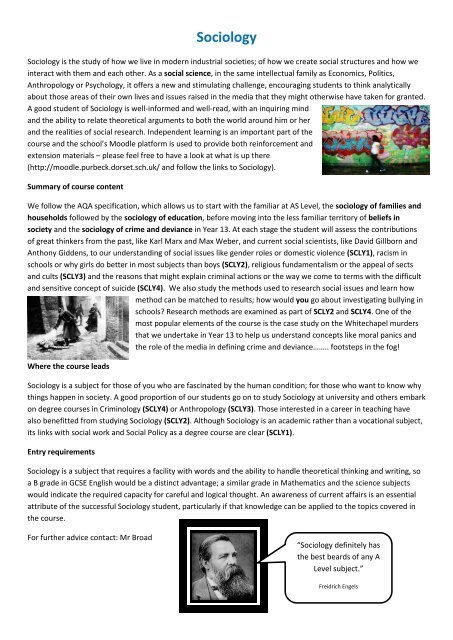Sixth Form Course Guide 2013-14 - The Purbeck School
Sixth Form Course Guide 2013-14 - The Purbeck School
Sixth Form Course Guide 2013-14 - The Purbeck School
Create successful ePaper yourself
Turn your PDF publications into a flip-book with our unique Google optimized e-Paper software.
Sociology<br />
Sociology is the study of how we live in modern industrial societies; of how we create social structures and how we<br />
interact with them and each other. As a social science, in the same intellectual family as Economics, Politics,<br />
Anthropology or Psychology, it offers a new and stimulating challenge, encouraging students to think analytically<br />
about those areas of their own lives and issues raised in the media that they might otherwise have taken for granted.<br />
A good student of Sociology is well-informed and well-read, with an inquiring mind<br />
and the ability to relate theoretical arguments to both the world around him or her<br />
and the realities of social research. Independent learning is an important part of the<br />
course and the school’s Moodle platform is used to provide both reinforcement and<br />
extension materials – please feel free to have a look at what is up there<br />
(http://moodle.purbeck.dorset.sch.uk/ and follow the links to Sociology).<br />
Summary of course content<br />
We follow the AQA specification, which allows us to start with the familiar at AS Level, the sociology of families and<br />
households followed by the sociology of education, before moving into the less familiar territory of beliefs in<br />
society and the sociology of crime and deviance in Year 13. At each stage the student will assess the contributions<br />
of great thinkers from the past, like Karl Marx and Max Weber, and current social scientists, like David Gillborn and<br />
Anthony Giddens, to our understanding of social issues like gender roles or domestic violence (SCLY1), racism in<br />
schools or why girls do better in most subjects than boys (SCLY2), religious fundamentalism or the appeal of sects<br />
and cults (SCLY3) and the reasons that might explain criminal actions or the way we come to terms with the difficult<br />
and sensitive concept of suicide (SCLY4). We also study the methods used to research social issues and learn how<br />
method can be matched to results; how would you go about investigating bullying in<br />
schools? Research methods are examined as part of SCLY2 and SCLY4. One of the<br />
most popular elements of the course is the case study on the Whitechapel murders<br />
that we undertake in Year 13 to help us understand concepts like moral panics and<br />
the role of the media in defining crime and deviance…….. footsteps in the fog!<br />
Where the course leads<br />
Sociology is a subject for those of you who are fascinated by the human condition; for those who want to know why<br />
things happen in society. A good proportion of our students go on to study Sociology at university and others embark<br />
on degree courses in Criminology (SCLY4) or Anthropology (SCLY3). Those interested in a career in teaching have<br />
also benefitted from studying Sociology (SCLY2). Although Sociology is an academic rather than a vocational subject,<br />
its links with social work and Social Policy as a degree course are clear (SCLY1).<br />
Entry requirements<br />
Sociology is a subject that requires a facility with words and the ability to handle theoretical thinking and writing, so<br />
a B grade in GCSE English would be a distinct advantage; a similar grade in Mathematics and the science subjects<br />
would indicate the required capacity for careful and logical thought. An awareness of current affairs is an essential<br />
attribute of the successful Sociology student, particularly if that knowledge can be applied to the topics covered in<br />
the course.<br />
For further advice contact: Mr Broad<br />
“Sociology definitely has<br />
the best beards of any A<br />
Level subject.”<br />
Freidrich Engels









